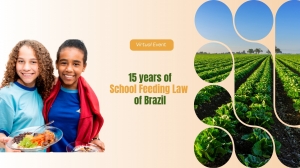FNDE celebrates 15 years of the School Feeding Law of Brazil
A virtual event will be held on June 20, organized by the National Fund for Educational Development with the support of the South-South Cooperation Program developed between the Brazilian Cooperation Agency and FAO.

Brasília, Brazil, June 10, 2024 - Professionals from different ministries and government bodies of Brazil, United Nations (UN) agencies, and representatives from countries in the region will gather virtually on June 20 to celebrate the 15th anniversary of Law 11.947/2009 - the School Feeding Law - considered a milestone for strengthening school feeding programmes in Brazil and in Latin America and the Caribbean. The virtual participation of Brazil's First Lady, Janja Lula da Silva, school feeding ambassador, is also planned.
The event is organized by the National Fund for Educational Development (FNDE), with the support of the South-South Cooperation Program developed between the Brazilian Cooperation Agency (ABC), of Itamaraty, and the Food and Agriculture Organization (FAO). The event will also feature the participation of the World Food Programme (WFP) Centre of Excellence against Hunger in Brazil.
Some innovations and results brought by the mentioned law to Brazil and the entire region will be celebrated, with testimonies from national actors and from other countries in the region, highlighting the influence of this legislation in the development of their school feeding policies and programmes.
The Law 11.947/2009 brought as one of its major novelties the provision that all students enrolled in public schools in the country have access to school meals. This represents, today, about 40 million students, with more than 50 million daily meals offered by the National School Feeding Programme (PNAE), in a collaborative regime with states and municipalities, in a joint and decisive action to help combat hunger.
In addition to legally determining the guarantee of school feeding for all students, respecting the principle of the human right to food, the law established that at least 30% of the FNDE transfers, the programme's executor, should be allocated for the purchase of local family farming products.
This normative framework also addresses the implementation of food and nutrition education actions in schools, important for promoting healthier eating habits in current and future generations. The PNAE covers about 150 thousand public schools, 250 thousand teachers, and 9 thousand nutritionists, distributed across 5,570 municipalities, 26 states, and the Federal District.
A law that inspires other countries
The interest in Brazilian law has attracted and continues to attract governments from other countries to learn about the operation of the PNAE. Therefore, since 2009, through the Brazil-FAO International Cooperation Programme, the Brazilian government, through the ABC/MRE and FNDE/MEC, along with the FAO, has been developing projects aimed at strengthening and consolidating school feeding programmes and policies in Latin America and the Caribbean.
Motivated by the Brazilian School Feeding Law, Bolivia, Ecuador, Guatemala, Honduras, Panama, and Paraguay have also designed and approved their legislation on the subject over the past years, with the technical assistance of Brazil-FAO International Cooperation. Additionally, El Salvador, Chile, and the Dominican Republic are processing their bills based on the paradigm of the human right to healthy and adequate food for all students during the school period.
As a result of this successful alliance between the Brazilian government, FAO, and Latin American and Caribbean countries, in 2018, the Sustainable School Feeding Network (RAES) was created, an initiative that already has the participation of 26 countries in the region.
Award
During the virtual event, the CAE Social Participation Award 2024 will be launched, aiming to highlight the importance of the participation of the School Feeding Councils (CAE, for its English acronym) in the execution of PNAE Brazil.
